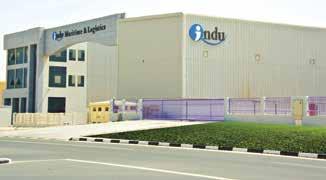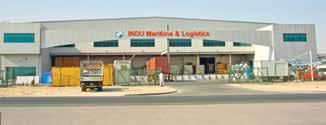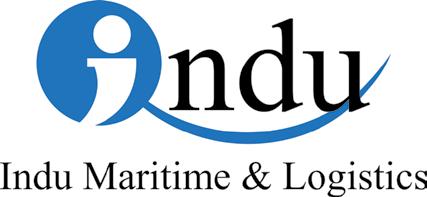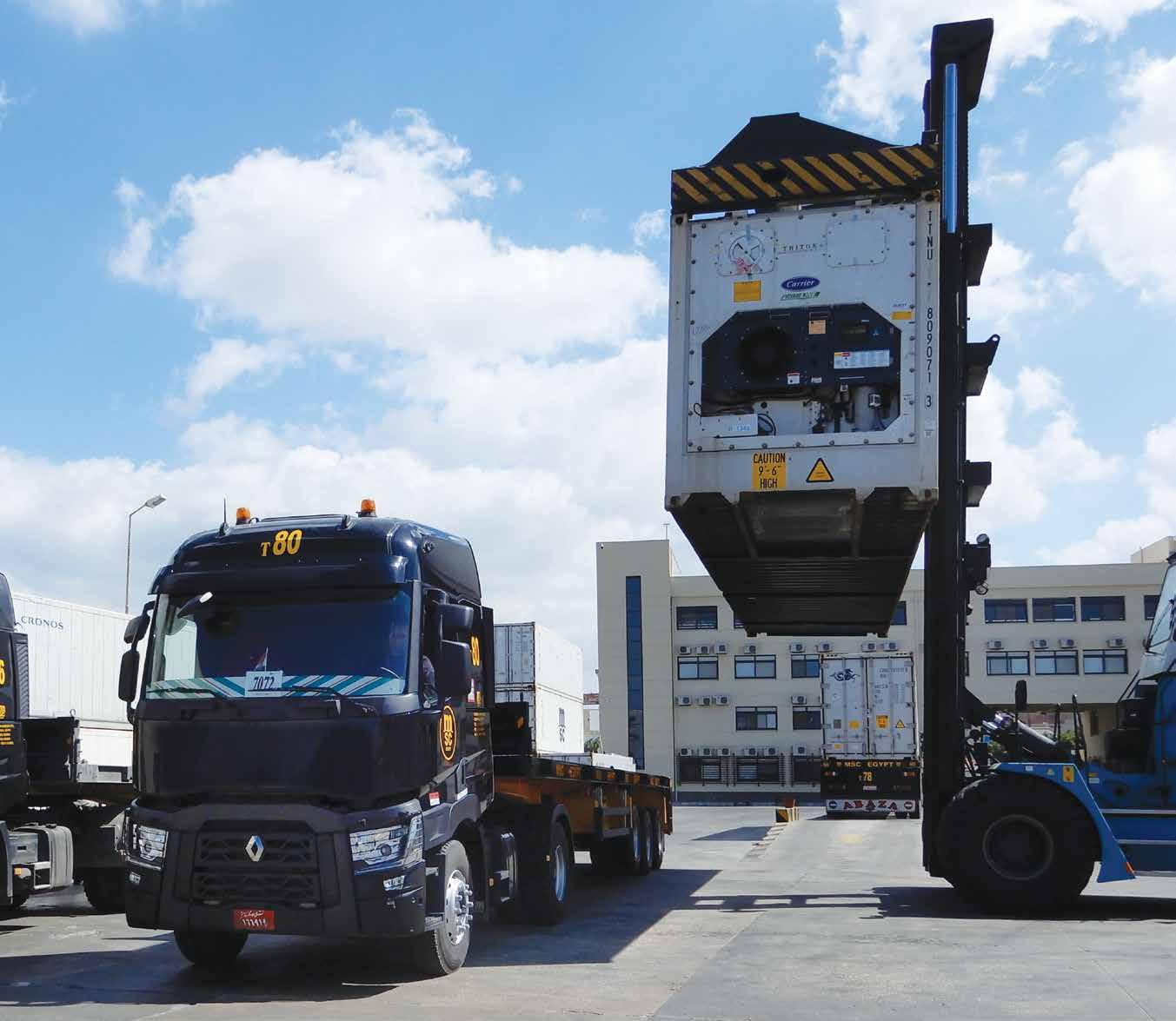
10 minute read
Feature
Revolutionizing the Supply Chain
Advertisement
Over the last thirty years, logistics has undergone a tremendous change: from a purely operational function that reported to sales or manufacturing and focused on ensuring the supply of production lines and the delivery to customers, to an independent supply chain management function
The focus of the supply chain management function has shifted to advanced planning processes, such as analytical demand planning or integrated S&OP, which have become established business processes in many companies, while operational logistics has often been outsourced to third-party LSPs.
The primary aim of the digital supply chain is to deliver insights to increase efficiency and to produce higher profits for the organisation. Relatively few companies have unlocked the full potential of digital technologies. A recent McKinsey study, for example, found that the average supply chain has a digitisation level of 43%, the lowest of five business areas that were examined. A mere 2% of the surveyed executives said the supply chain is the focus of their digital strategies.

The same McKinsey research suggests that on average, companies that aggressively digitise their supply chains can expect to boost the annual growth of earnings before interest and taxes by 3.2% – the largest increase from digitising any business area – and annual revenue growth by 2.3%. From a financial perspective, then, digitising the supply chain is an important investment.
Industry 4.0 creates a disruption and requires companies to rethink the way they design their supply chain. Several technologies have emerged that are altering traditional ways of working. On top of this, mega trends and customer expectations change the game. Besides the need to adapt, supply chains also have the opportunity to reach the next horizon of operational effectiveness, to leverage emerging digital supply chain business models, and to transform the company into a digital supply chain.
Logistics News ME asked leading industry experts to discuss on how digitization and technology is revolutionizing the supply chain network in Logistics.
Software Solutions Gordon Barnard, VP Sales, Middle East and South Asia, Hellmann Worldwide Logistics
“At Hellmann Worldwide Logistics, we live our FAMILY DNA emphasizing on aspects of prioritizing our people in our organization and provide our customers with a high level of service excellence. Hellmann Worldwide Logistics has launched multiple digitization initiatives to support our customers with their transforming supply chains.
Hellmann Worldwide Logistics has undertaken multiple digitization initiatives in the areas of Blockchain, IOT, Robotic Process Automation (RPA), Data Science and Artificial Intelligence. These automation plans will lead to reduced human effort, faster process lead

times with zero errors.
Apart from moving towards eAWB, eBL, ePayments, eInvoices, online quotations and bookings, Hellmann is also working on multiple RPA and OCR solutions to reduce manual effort, improve supply chain visibility and reduce costs.
Hellmann’s customs documentation processing time is among the best in the market with less than 0.0001% error, being used world over with Dubai being the competency center for the technology in use.
Hellmann’s Smart Ocean service offering is a game changer offering companies real time visibility solutions leading to cost savings from demurrage, detention and other freight costs. The application uses all the current hardware and software technology, AI and satellite updates to connect dots across the supply chain to provide real time visibility. The system uses this technology to predict the future status of shipments and hence, it supports our customers to plan their supply chain with little or no surprises. Our customers, especially in the perishable, fashion, pharmaceutical and automotive industries, use this technology to plan inventory at their hubs and retails outlets.
With the growing trend of venture capitalists causing the industry to mushroom with new companies is resulting in shrinking margins and hence, putting more pressure on traditional third party logistics companies. An organization definitely needs a solid traditional supply chain foundation, such as Hellmann’s, to succeed with digitization initiatives. While we work towards sustainability and supply chain cost reduction, digitization initiatives also call for high investments. However, the EBIT will improve only if we improve productivity and efficiency in our processes. Hence, digitisation efforts go hand in hand with the vision of sustainability, along with maintaining focus on our people and our customers.”
1 MILLION SQ FT OF WAREHOUSING SPACE

BATTERY CHARGING COLD STORAGE OPEN YARD BULK & RACK TEMPERATURE CONTROL CHEMICAL (TEMPERATURE CONTROLLED) (DG & NON-DG)




CONTACT US

INDU MARITIME & LOGISTICS JAFZA, United Arab Emirates Telephone: +9714 - 8860141 Fax: +9714-8860142 Email: info@indulogistics.com
Collaborative RealTime Visibility Atif Rafiq, CEO & Co-Founder, Qafila
“Digital transformation is not a process with a start or an end, neither is it just about the implementation and the use of technology. Digital Transformation, at the fundamental level, is the ability of an organization to adapt to rapid changes brought forth by evolving digital technologies. It is how technology changes the conditions under which business is done, in ways that changes the expectation of customers, partners, and employees. Qafila is re-engineering the shipping process by simplifying it and providing structure to shipping data across supply chains.
The idea of continual adaptation to a constantly changing environment with a key focus towards the customer’s problem and his experience is our key objective. As one of the pioneers of digital transformation in the freight forwarding sector, Qafila’s platform allows users to manage their entire supply chain through a cloud platform by giving them 24/7 accessibility, the ability to schedule their transport plan at the time of booking, bring all their communications related to this in one place.
In such supply chain networks, Qafila is bringing a low cost solution to visibility without the need for expensive hardware. You get a full supply chain visibility from the moment the FCL is picked up at origin to the moment the empty FCL is returned to the port at its destination.
While visibility is always a plus, a “collaborative real-time visibility” means continuous refresh of information with all participant hav

ing the ability to see the transaction in progress. This gives the ability to immediately act upon new circumstances and gives a single version of the truth to both the trading parties on Qafila. This is a unique feature of Qafila where trading parties within the supply chain network can invite each other on the collaborative Qafilaplatform and not just view the progress but also initiate a two-way orders request based on the parameters and rules defined for each other.
It also helps shipping managers manage all their shipment related information and documents in a shared workspace with complete transparency & visibility into the entire shipping process.
Our USP is that we are an organization that has tech-knowledge and technology to simplify shipping. So if a trucking company, which is part of the supply chain network, is not digital in their processes we help them to digitalize their processes and become part of our ecosystem. Our real x-factor is our agile mindset that this technology will become the industry standard in a couple of years and we need to continuously evolve globally with the latest trends in and around our industry. While in the process, we digitize and give structure to a customer’s shipping data throughout its supply chain.
Qafila technology not only provides data but also works with the user to use that data for streamlining the logistics process and identifying any potential bottlenecks. This unlocks new opportunity within the supply chain with data-driven insights and customized reporting because data quality provides the basis for all optimization efforts in any organization. We create an atmosphere of collaboration between customers, partners, & employees to bring all that data in structured format to identify risk, solve problems that may arise, building on the solutions, measuring & experimenting with different iteration of the solution and finally again measuring it.”
Automating and usage of AI in Supply Chain
André N. Verdier, Managing Director JDA Software Middle East
“Supply chain transformation is well underway and within the next 12 months artificial intelligence (AI) and machine learning (ML) will become a standard feature in complex supply chains.
According to the 2019 JDA & KPMG Digital Supply Chain Investment Survey, 80% of CXOs saw AI and ML as the most impactful technology for solving complex supply chain problems, while 75% of CXOs believed that cognitive and predictive analytics would have a disruptive impact.
The survey revealed that interest in AI and ML have eclipsed other technology trends like blockchain and the Internet of Things (IoT) and CXOs agree that the time is now - the technology is seen as both high impact and high priority for adoption in the near future.
The survey confirms what I’ve been hearing in many business conversations in the Middle East. Both retail and manufacturing companies are investing in AI and ML to optimise their supply chains and to obtain more accurate demand forecasts and anticipate disruptions.
The key driver is mostly the desire for endto-end visibility and traceability of their supply chain to avoid delays, mistakes or inefficiencies. The goal is to ultimately shift to an autonomous supply chain.
By bringing together cloud-based technologies, IoT, AI and ML, an autonomous supply chain will automate complex decisions across the entire value chain, reducing the need for human intervention, creating efficiencies, reducing costs and saving time. This bold goal has the potential to completely transform how supply chains currently work.
AI and ML collect and analyse data, particularly micro data or ‘little data.’ This provides greater visibility but also enables decisions to be automated along the supply chain. Data points

may include social media data, weather or consumer behaviours. By interpreting and acting on this data, AI and ML can streamline the process. Applied to distribution in retail this will mean, for example, optimising replenishment and fulfilment, or hyper personalisation of the product and optimised pricing, with a direct impact on profitability. In manufacturing this will translate in production and supply disruptions’ predictability and proactive problem resolution. With the support of an autonomous supply chain the job of the people in the industry will become much more strategic - to direct the machines while we oversee the big picture.
Human Intelligence Molds Artificial Intelligence Jonathan Wood, General Manager, Middle East and Africa, Infor

Greater linking between the human mind and artificial intelligence is emerging. Researchers have advanced studies of the human mind, including infants, to better understand how learning develops at an early age. The goal is to enhance artificial intelligence and machine learning models to be less linear and ridged, and more curious and perceptive. Current machine learning engines require feeding thousands of labeled images to teach machines to recognize what simple objects or animals such as a cat looks like. Yet errors are still prone when images of blurred shapes resembling that object are presented. An infant, on the other hand, learns through a handful of experiences what a cat looks like, and these might be actual photos or drawings in books. Infants also learn through experimentation and curiosity. In order to imitate this experience, some ML programs are being developed to be rewarded for curiosity versus accuracy. This research, linking human brains to AI, will increase and begin to show specific results in further enhancing human attributes in machines.
As supply chains progress towards autonomous processes, machine learning and AI platforms will continue to learn by observing humans and data signals that span across parties, regions and supply chains, to understand the complexities and nuances of global trade. Some workflows will move to lights-out status, while many other complex scenarios involving multiparty collaboration and network-wide orchestration will require greater learning from their human counter-parts.
STRONG ON BUSINESS


RENAULT TRUCKS C ROAD Robust, reliable, ready for the long haul, trust the Renault Trucks C Road to deliver in even the toughest terrain. Backed by the quality service support of our professional dealer network, you can count on us to keep your truck operating to the highest standards throughout its working life.







